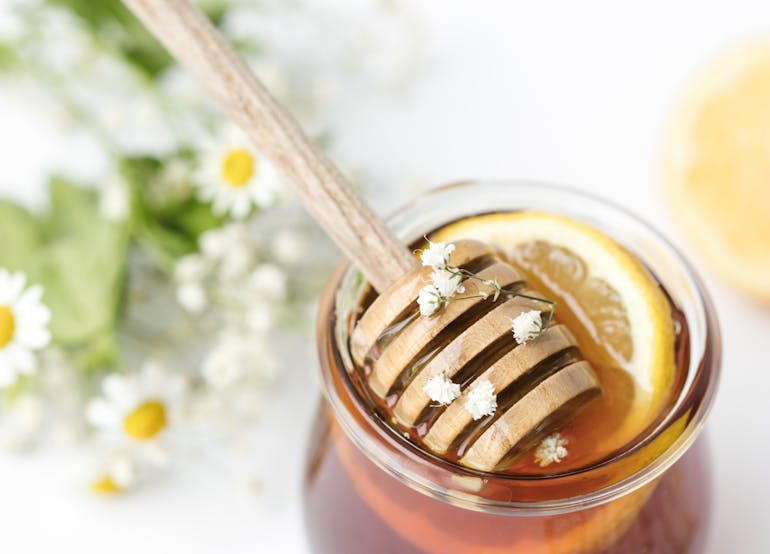10 natural remedies for hay fever
Reviewed and fact-checked by Giulia Guerrini, Superintendent Pharmacist. Read our editorial policy to see how we create informative, accurate content.
When symptoms of hay fever strike, most of us reach for medication – like an antihistamine – to give us much needed relief. But not everyone has that option. Some hay fever sufferers can’t use medicines: whether it’s because they’re pregnant, allergic to certain medications or it’s just a personal preference. If that’s you, there’s no need to worry – there’s a whole range of natural remedies for hay fever to try.
We’ve broken down 10 of them here, including home remedies, as an essential guide for the hay fever season.
1. Get a taste of your local honey
Probably one of the sweetest home remedies, local honey can work wonders for hay fever sufferers. The important bit: this isn’t just an excuse to go to your local farmer’s market – this honey really has to be local. Normal honey you find in a supermarket won’t do the trick, as the bees need to create the honey from local pollen. Once you start eating this, you’ll build up a natural tolerance to the pollen in your area. All it takes is a teaspoon each day and you’re set to go. Not sure where to get it? You can usually find some local honey in small independent shops or markets. Here’s a hot tip: you could even add some local honey to a herbal tea like Pukka Three Chamomile Tea, which is also one of our remedies for hay fever – but more on that a bit later.
2. Pick up some probiotics
Healthy gut bacteria plays a huge part in keeping your immune system healthy. So, it makes sense that it could help during the hay fever season, too. Allergies and hayfever is really an immune response, which causes allergic reactions to different types of pollens, weeds and grass. This isn’t a quick fix to give you immediate relief for the symptoms of hay fever – it’s a long game. Some studies have shown that taking a probiotic supplement for a few months has helped hay fever sufferers. You could try a supplement like Optibac Probiotics for Every Day or eat more foods that are naturally high in probiotics, such as sauerkraut, tempeh, kimchi, miso or even gherkins.
3. Add in an antioxidant: Quercetin
It’s a bit of a tricky word to say, but Quercetin is a brilliant little antioxidant that’s a natural antihistamine. You can find high levels of quercetin in a number of foods including onions, apples, black tea, berries and capers and red wine. Hold off on pouring that glass of merlot though, as wine contains other compounds that can make your hay fever worse. We know it’s not always easy to get in a good amount of the right foods though, so you might want to try a quercetin supplement such as Solgar Quercetin Complex. The formula of this supplement is exclusive to Solgar and also includes vitamin C and bromelain, which can also help with symptoms of hay fever.
4. Sip on herbal tea
If you’re still suffering from the symptoms of hay fever, try swapping out your morning brew for a calming cup of chamomile tea. As you’ll already know, chamomile helps you to relax and is great before bed. What you might not know is that this light, golden tea is also a natural antihistamine and even has anti-inflammatory properties. If you fancy something with a bit more zing in the morning, you could try a herbal tea with ginger and turmeric – two of nature’s anti-inflammatories. Check out Pukka Three Ginger Tea, which has a combination of both of these warming spices.
5. Give Bromelain a go
Bromelain is a little wonder enzyme. It’s used for swelling and inflammation, which tackles a lot of the symptoms of hay fever. You can find this amazing enzyme in the core and juice of pineapples, which is great news for fruit salad lovers. If you’re allergic to pineapples, it’s probably best if you avoid bromelain. If you can’t find any pineapples in the shops, you might consider taking a bromelain supplement such as Nature’s Aid Ginger, Tumeric and Bromelain tablets. Like we said before, ginger and turmeric are brilliant for hay fever sufferers – so with the bromelain included, this is a hay fever powerhouse you might want to stock up on.
6. Ditch the dairy
So, this one isn’t one of the natural remedies for hay fever, but it could certainly help ease the symptoms. Hay fever sufferers should try to avoid dairy products as they can increase the production of mucous, which will make a stuffy nose caused by hay fever even worse. It’s not all bad news for that cheese toastie and latte you love: there’s loads of dairy substitutes on the market like soya and nut milks and vegan cheeses that you could try. They’re tastier than you might think. Trust us!
7. Smooth on Vaseline or coconut oil
This is a super simple way to tackle some of the side effects of hay fever. Just dab some Vaseline Petroleum Jelly or Kiki Organic Coconut Oil around your nostrils. They act as a blocker for pollen, catching and trapping it before it can get into your nasal passage and cause a blocked or runny nose.
8. Clear out your sinuses with saline
The first thing you should know is that saline is completely natural – it’s essentially salt water. You can try a saline sinus rinse, which washes out pollens and irritants from your nasal passage. That can sometimes be a little uncomfortable, so you could opt for something like Sterimar Hayfever and Allergy Relief Spray. It’s super simple to use and also clears allergens out of your sinuses.
9. Try a few drops of eucalyptus oil
Essential oils are the true wonders of nature. If you’re suffering from the symptoms of hay fever, you could try putting a few drops of Numark Eucalyptus Oil into a bowl of hot water and breathe in the steam. This oil is a natural anti-inflammatory and could help to relieve a stuffy nose.
10. Avoid alcohol
The bad news is that most alcohol, especially beer and wine, will make the symptoms of hay fever worse. That’s because they contain both histamines and sulphates. If you do decide to have a small drink, you should stick to clear spirits like gin and vodka. They’re not natural remedies for hay fever and won’t help your hay fever, but they don’t contain sulphates, so they’re not likely to make symptoms worse.
We stock a wide range of medicated and natural remedies for allergies and hay fever for you to try. Order today, and we’ll get them packed up and sent to you tomorrow.

